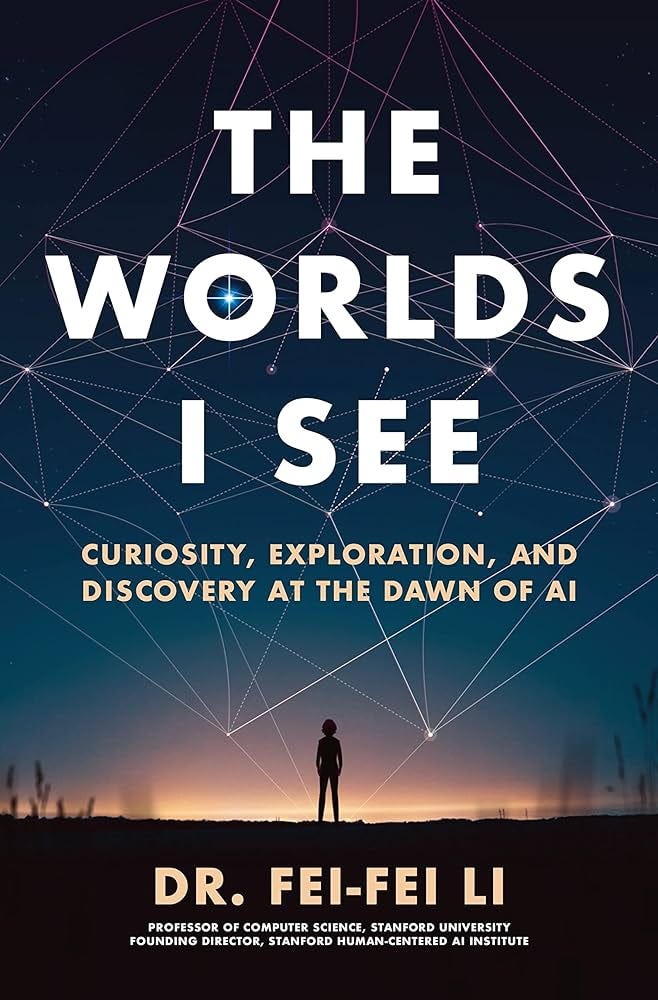The 216th Block: Where does the good news go?
Let me share with you Chris Moran's custom GPT for the Digital News Report
This week…
Your reading time is about 8 minutes. Let’s start.

The highly anticipated(?) 2024 Digital News Report by the Reuters Institute for the Study of Journalism was released earlier this week, so I’m sure you’ve all read about the “great platform reset.” Chris Moran, head of editorial innovation at The Guardian, customised a GPT to explore the report. Try it here.
Also, congrats to NVIDIA for being the world's most valuable company ig.
And now, a selection of top stories on my radar, a few personal recommendations, and the chart of the week.
ICYMI: The Previous Block was about people and their public profiles. FWIW:
Round 2! Von der Leyen, Meloni and the battle for Brussels top jobs by Barbara Moens and Jacopo Barigazzi for Politico.
From Nobel peace prize to civil war: how Ethiopia’s leader beguiled the world by Tom Gardner for The Guardian.
CORRECTION NOTICE: In the original post then went into your inbox, you would have read that “I’m a fan of memoirs, but [Coming Home (2024) by Brittney Griner with Michelle Burford] is an exception,” which sounded like I did not enjoy the book. I meant to say that I’m NOT usually a fan of memoirs, but the book I read was the exception. As in, I totally, 100 per cent, DO indeed recommend the book! Sorry BG!BUT WHAT ABOUT TIKTOK!
Social media warning labels and school cell phone bans: Do they unlock better youth mental health?
Audrey-Ann Deneault (Université de Montréal), Sheri Madigan (University of Calgary), and Tracy Vaillancourt (University of Ottawa) for The Conversation:
This week, the US surgeon general Dr Vivek Murthy called for health warnings on social media for younger users. This recent call follows an earlier Advisory on Social Media and Youth Mental Health, also published by the surgeon general.
Health warnings on social media would be analogous to the ones seen on cigarette packages, serving as reminders to parents and youth of the mental health risks of social media. The surgeon general also called for schools to become phone-free environments. Although in his op-ed, Murthy acknowledged that research on these topics is not yet conclusive, he also noted that we “don’t have the luxury to wait for perfect information.”
Look. They had a similar moral panic over video games, didn’t they? How did that work out? Loosely linked:
US Justice Department filed suit against Adobe, arguing its sign-up process purposefully tricks consumers into subscriptions that are hard to cancel by Hunter Schwarz for Fast Company.
Instagram recommends sexual videos to accounts for 13-year-olds by Jeff Horwitz for WSJ. (Archive link.)
Perplexity is a bullshit machine by Dhruv Mehrotra and Tim Marchman for Wired. (Archive link.)
Leading chatbots are spreading Russian propaganda by Ina Fried for Axios.
TikTok confirms it offered US government a kill switch by Imran Rahman-Jones for BBC.
CENSORSHIP AND SURVEILLANCE
It can feel like there’s no way out—political scientists face pushback on their work
Dyani Lewis and Alison Abbott for Nature:
Other countries are also seeing increased political interference in academia — and political bite back for academics working on politics. Hungary is one example. Its government has been headed since 2010 by Viktor Orbán, a self-proclaimed proponent of ‘illiberal democracy’, which eschews Western liberal values in favour of policies that promote national interests. In 2019, his government took control of the country’s research institutes, and concerns about loss of academic freedom led to an international outcry.
Turkey is another country that has been on an increasingly authoritarian path, and has taken a number of measures to curtail academic freedom over the past 15 years. The situation peaked after the country declared a state of emergency in July 2016 in the wake of an attempted coup. Thousands of academics who were suspected — often without grounds — of being complicit in the coup or in open disagreement with the government were arrested and lost their jobs.
Elsewhere, the threat of political pressure has changed the nature of research, says James Gomez, who in 2015 founded the Asia Centre, an independent research institute in Bangkok. He says that working outside a university can be advantageous. “You can’t do free, unfettered research about these matters — not just elections, but democracy and human rights — without having challenges from within the structure of a university,” he says. The result, says Gomez, is that a lot of election scientists throughout Asia “practise a lot of self-censorship”. They either stop writing about contentious topics, or they write in a “euphemistic way”, he says. For example, Malaysian political scientists might write about Korea or Japan, rather than writing about situations in their own country.
To the vast majority of the public, governments and academia (and the media) are the same, though. We’re all in cahoots with each other. Loosely linked:
Where in the world the women scientists are by Alison Snyder for Axios.
Second Canadian scientist alleges brain illness investigation was shut down by Leyland Cecco and Campbell MacDiarmid for The Guardian.
Social media censorship in Malaysia surges during PM Anwar’s first year in power by Shannon Teoh for The Straits Times.
Controversial facial-recognition company quietly expands into Latin America by Vera Bergengruen for Time.
Kenya closes probe of Worldcoin, opening the door to a relaunch of its orbs after a year-long suspension by Annie Njanja and Natasha Lomas for Tech Crunch.
NEW LITERACY
Are you 80 per cent angry and 2 per cent sad? Why ‘emotional AI’ is fraught with problems
Ned Carter Miles for The Guardian:
Lisa Feldman Barrett is a professor of psychology at Northeastern University in Boston, Massachusetts, and in 2019 she and four other scientists came together with a simple question: can we accurately infer emotions from facial movements alone? “We read and summarised more than 1,000 papers,” Barrett says. “And we did something that nobody else to date had done: we came to a consensus over what the data says.”
The consensus? We can’t.
“This is very relevant for emotional AI,” Barrett says. “Because most companies I’m aware of are still promising that you can look at a face and detect whether someone is angry or sad or afraid or what have you. And that’s clearly not the case.”
I am 100 per cent unamused. I feel like I have watched this film before. Loosely linked:
Populist, nativist, neofascist? A lexicon of Europe’s far right by Jon Henley for The Guardian.
From ALICEs to DINKs by Erin Snodgrass and Jacob Zinkula for BI.
Meta expands AI translation to 200 languages but experts suggest talking to native speakers by Anna Desmarais for Euronews.
From Swahili to Zulu, African techies develop AI language tools by Bukola Adebayo, Nita Bhalla, and Kim Harrisberg for Context.
Other curious links, including en español et français:
Pentagon ran secret anti-vax campaign to undermine China during pandemic by Chris Bing and Joel Schectman for Reuters. Remember how the US caused vaccine hesitancy in Pakistan because they were trying to find Osama bin Laden through a vaccination drive?
People blamed an influencer’s murder-suicide on the eclipse. What really happened? by EJ Dickson and Brittany Spanos for Rolling Stone. (Archive link.)
The reluctant refugee by Danny Ramadan for Maclean’s.
Pew Research Center revises report about racial conspiracy theories after backlash by Char Adams for NBC.
Boeing CEO admits it retaliated against whistleblowers by Frank Landymore for Futurism.
With… murder?Great, this one will fuel the conspiracies.As Zimbabwe’s economy collapses, traditional healers are selling wealth advice on TikTok by Chris Muronzi for Rest of World.
Solitarios, enojados y assustados: ¿por qué algunos jóvenes se radicalizan? por Jair Ortega de la Sancha en Gatopardo.
La efimeridad de los archivos ‘online’: ¿están a salvo nuestras fotos? por Ana Bulnes en El País.
Crece en España GoFundMe, la nueva forma de caridad personalizada en internet: “Hay mucha actividad en Europa por Gaza” por Jordi Pérez Colomé en El País.
Des citoyens canadiens accusent le régime algérien d’espionnage et d’intimidation par Brigitte Bureau dans Radio-Canada.
Et soudain, les mèmes se transforment en affiches de campagne pour le Front populaire par Julien Lousson dans Numerama.
L’usage du mot « immigrationniste », une forme de complotisme par Pascal Riché dans Le Nouvel Obs.
What I read, listen, and watch…
I’m reading The Worlds I See: Curiosity, Exploration, and Discovery at the Dawn of AI (2023) by the godmother of AI Fei-Fei Li, the only academic who can say that she was the doctoral advisor to Timnit Gebru, Andrej Karpathy, AND Olga Russakovsky. This memoir beautifully weaves philosophical questions about the state of artificial intelligence with Li’s journey as an immigrant. I also appreciated how her writing paid great tribute to her teachers (especially that one math high school teacher Bob Sabella) and fellow academics, as I, too, am fond of educators and education. Some people claim Li’s ties with China make her a CCP plant, but if the book tells you anything, it’s that she’s probably an Italian.
I’m listening to Micah Loewinger’s interview with NPR media correspondent David Folkenflik about the WaPo CEO drama for On the Media.
I’m watching DW’s documentary on migration in Europe.
Chart of the week
Reuters Institute’s 2024 Digital News Report said the great platform reset is underway, with the chart below showing a decline of Facebook for news and a growing reliance on alternatives including messaging apps and video platforms.
While the chart is based on selected countries—the UK, USA, Germany, France, Spain, Italy, Denmark, Finland, Japan, Australia, Brazil, and Ireland—the report further stated that Facebook news consumption is down 4 points across all countries in the last year. It is that is higher in countries such as the Philippines (-11), Argentina (-11) and Colombia (-10). YouTube is used for news by many people in the global sample, especially in the Global South. The use of TikTok for news is even bigger among young people and in countries such as Thailand (39 per cent), Kenya (36 per cent) and Indonesia (29 per cent).
Read the executive summary here or the full report (in PDF) here.



